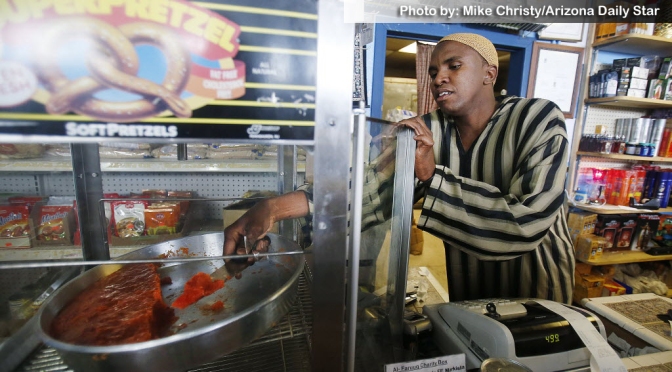
Recently I spoke with Abdirahman Chirango, a 29-year-Somali native, about the current situation for refugees in Kenya.
In the article, I briefly touch upon how as a 6-year-old, Chirango had to flee on foot from his home country of Somalia to the Kenyan border. His village in lower Juba was raided and his mother was killed in front of him and his siblings by four masked men because she refused to be raped. There was nothing they could do but run.
There is much more to his story than what I could include in the article. His is a story about determination and perseverance. Of finding refuge and hope in education.
Chirango and his family walked for about 15 days to get to the Kenyan border. His aunt and uncle carrying his siblings, then 3 and 1 years old, in their arms. Back then he assumed his father was dead (he found out he was still alive many years later, when he was already in the United States).
“It the end only some survived,” he said inside the University of Arizona library, wearing a crisp white shirt, dress pants and pointy shoes. “Some people got tired and couldn’t walk anymore.”
Their feet would swell and even though their mind was telling them to go, he said, they just couldn’t walk.
They were so thirsty some would drink their own urine. In some cases, friends or relatives would offer their urine to another under the promise that they return the favor later on.
From 100 families traveling together, Chirango estimates only 20 made it.
“It was sad,” he said.
Even fathers gave up on their children.
Chirango lived as a refugee for 13 years in Kenya’s two camps, Dadaab and Kakuma, before coming to Tucson, Arizona, in 2005.
When asked about life in the camp, he repeatedly said it was “really, really hard.”
“I had to go to school during the day, then come back home and find ways to provide for me and for my grandma,” he said.
His grandmother used to fetch wood and weave baskets, fans and mats to sell, but Chirango had to assume the responsibility of providing for the family when he was about 12 years old, when his grandma could no longer work.
He would offer his services to other refugees in the camp. At one point he fetched water for a family for an entire month, earning a little more than $1.
Sometimes they would only have boiled beans and corn to eat, but they were lucky, he said, some families didn’t even have that.
“A lot of my peers left the refugee camp to go to neighboring towns in Kenya, but for me, inside my heart I know life is hard, but I can’t just walk away like this,” he said. “For me, I thought, no matter what happens I don’t want to give up my education because it’s the only way out.”
Chirango speaks with immense pride of his accomplishments in school.
He was always No. 1, he said. He might not have had clothes, shoes or books, but he was always No. 1.
Kenya taught him how to be a strong person, he said, to not walk away from his problems, but to instead find long-term solutions.
As a Bantu Somali, he said he was discriminated against by other Somalis. He was beaten until he bled. Forced to sit on the floor. Made to beg to borrow a classmate’s books. Robbed of his awards. Called slave. Dog.
But none of that mattered if he could continue learning to speak English, to write the ABCs.
“I had to learn to adapt,” he said. “If they told me to go and sit down on the floor, I did. If they beat me, I took it like a man.”
When he transferred from primary to secondary school, he had 805 points – 32 more points than the student who had held the previous record.
How does he remember the precise number, so many years later? “It was a very glorious moment in my life,” he said.
Today Chirango is working towards a bachelor’s degree in political science at the University of Arizona. After that he wants to earn a master’s degree (he still doesn’t know in what, though). All while helping run Tork’s Café and Grocery and, together with his wife, raising four young children.
To say I was impressed by what he has accomplished despite all the challenges he has faced would be an understatement. It definitely gave me something to think about. It was a great reminder of what we can do if we set our minds to it.




